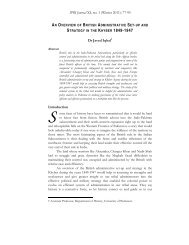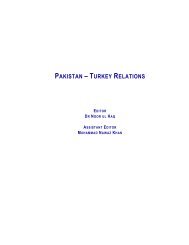120 Whither Kashmir? (Part II) - Islamabad Policy Research Institute
120 Whither Kashmir? (Part II) - Islamabad Policy Research Institute
120 Whither Kashmir? (Part II) - Islamabad Policy Research Institute
You also want an ePaper? Increase the reach of your titles
YUMPU automatically turns print PDFs into web optimized ePapers that Google loves.
22 IPRI Factfile<br />
expressed wishes - all these from the country which claims to be the<br />
world’s largest democratic secular state.<br />
India’s first head of state, Lord Mountbatten, is on record having<br />
said on Oct 27, 1947, that since the “question of accession [of <strong>Kashmir</strong>]<br />
should be decided in accordance with the wishes of the people of the<br />
state, it is my government’s wish that as soon as law and order have been<br />
restored in <strong>Kashmir</strong>... the question of the state’s accession should be<br />
settled by a reference to the people.” Again, one of India’s founding<br />
fathers and first prime minister, Pundit Jawaharlal Nehru, whose<br />
government took the <strong>Kashmir</strong> issue to the United Nations, told the<br />
Indian Constituent Assembly on Nov 25, 1947, “In order to establish our<br />
bona fides, we have suggested that, when the people [of <strong>Kashmir</strong>] are<br />
given the chance to decide their future, this should be done under the<br />
supervision of an impartial tribunal such as the United Nations.” On<br />
June 26, 1952, Mr. Nehru told Indian parliament, “If ... the people of<br />
<strong>Kashmir</strong> do not wish to remain with us, let them go by all means; we will<br />
not keep them against their will, however painful it may [be] for us.”<br />
Against these solemn words and relentless struggle of the people of<br />
<strong>Kashmir</strong>, New Delhi today has only two lame excuses: one, the pledges<br />
and the UN resolutions calling for a plebiscite in <strong>Kashmir</strong> have become<br />
outdated; two, what is going on in the <strong>Kashmir</strong> valley is not a people’s<br />
revolt but the result of “cross-border terrorism.” Both arguments are as<br />
self-serving as they are laughable. Time cannot abrogate moral values nor<br />
invalidate the international community’s right to intervene in flash-points<br />
of conflict arising from denial of freedom and involving tyranny and<br />
persecution. We have the recent example of East Timor, where a dispute<br />
was settled through a reference to the wishes of the people under UN<br />
supervision. Indonesia upheld the people’s verdict, however “painful” it<br />
might have been to it.<br />
For <strong>Kashmir</strong>, despite more than a half century’s lapse, all United<br />
Nations resolutions and the Indian leaders’ own pledges remain<br />
unfulfilled but valid because they are based on the time-honoured values<br />
of freedom and inviolability of basic human rights.<br />
<strong>Kashmir</strong> continues to be a flashpoint of conflict. Pakistan and India<br />
have earlier fought two full-fledged wars on <strong>Kashmir</strong>, and they came close<br />
to a third following December 2001’s mobilization of its forces by India<br />
and amassing them on Pakistan’s borders under the plea of combating<br />
terrorism. With both the South Asian neighbours armed with nuclear<br />
weapons, another conventional war on <strong>Kashmir</strong> has the potential to turn




